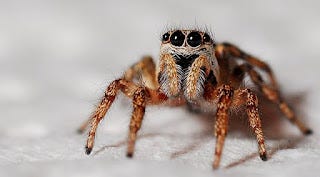Conversation with a Spider
My bathroom is white. The walls are white, the ceramic tiles on the floor are white, the sink and the bathtub are white, the ceiling is white. There is no window.
Recently, I took a shower. The light was on, as well as the fan. The air was full of humidity. When I was about to get out of the shower, before putting my foot on the ceramic, I saw a big hairy spider running around in circles very quickly and she looked lost and in a hurry to go nowhere.
I felt something then and I said it out loud: “Oh spider, I understand your unease. How can a white, windowless room, where the light comes from a lightbulb, the wind from a fan and the heat from a radiator, exist and be considered normal? And in fact, when I think about it, the power for the light, the wind and the heat comes from a huge dam somewhere far up north. And there is nothing green! Of course you’re lost, spider.“
Then the spider stopped her race, looked at me for a moment and hid behind my toilet. I got out of the shower, got dressed and went into my living room. The right angles and white walls were looking at me suspiciously, hurting me. I felt attacked, battered, as if I were in jail. (And I understood where Feng Shui came from!)
How did we, as a civilization, come to consider normal those white, sterile, cold, impersonal and windowless spaces with right angles that hurt our eyes? The answer is simple: by placing our consciousness in our brain and not in our heart. By not feeling deeply what our senses were absorbing. And even, by our belief that feeling is not important.
We have lost the response of the heart to what is presented to the senses.
- James Hillman
And what’s worse? When we place our consciousness in our brain and not in our heart, we become like those houses that we consider normal. We become sterile, cold, and rational. Our access to our own depth and that of the world diminishes. We have a spirit with no window looking out to the outside, on the not-humain, on the wilderness of the world.
*
This is the point where I introduce to you the concept of the “climate of mind”, which was coined by Timothy Leduc, a Canadian researcher who wrote A Canadian Climate of Mind: Passages from Fur to Energy and Beyond. Our animals, our indoor plants, or furniture, but also the trees, lakes, mountains, wildflowers, rocks, ecosystems as a whole, everything that exists gives off a certain climate of mind. And those climates have the power to insert themselves in our mind and take possession of it without us being conscious of it. Go live in New York for a year and your climate of mind will probably be a lot more frenetic than it is now! And a contrario, most people will say that a walk in the woods is calming to them. (A whole year would be even better.)
When I met Stephen Harrod Buhner, my friend and mentor who died last December, I felt his presence like that of an old oak. That is what was I found the most amazing about him. And I decided right then and there that I wanted to be able to adopt and give off a climate of mind other than that of a modern human. To completely absorb the climate of mind of a part of the wilderness or of a particular old tree that still remains in this world and to have spend so much time with this climate that I adopt it as my own (or that it adopts me as its own, as the case may be), that my presence be that of an old-growth forest or a 200 year old pine tree.
Before I finish, I have an exercise to suggest: choose two plants in your environment, be they indoor plants, cultivated or wild. Choose plants of a similar size but belonging to different species. Start by focusing your attention on the first plant, its color, its shape, its texture. You can look at it very closely, touch it, smell it and even taste it if it’s edible. Relax your body. Then ask yourself ‘’how does it feel?’’, what climate of mind that plant gives off. Do the same thing with the other plant.
You will see that, with practice, this exercise opens the door to many things that might have seemed impossible to you in the past. For example, I use this kind of feeling sense when I have to buy a car, when I want to choose what book to read, where to live, how to dress today, what medicinal plant to take, and even what to eat for dinner. Of course, other things come into play, but I consider this feeling sense like a very real sixth sense.


